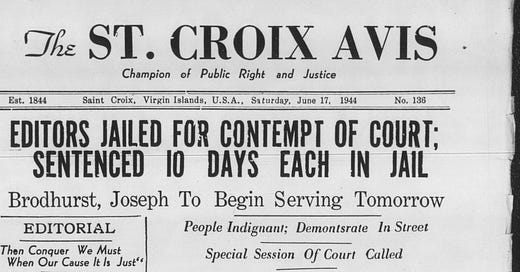
Discover more from State of the Territory News
Editorial: Let’s Talk About the Death of the St. Croix Avis
By 2019, the Avis became such a rarity that Government House struggled to circulate the paper for staffers not working in St. Croix.
After a 180-year reign, the longest-running print newspaper in the U.S. Virgin Islands announced in January that it would cease publication. The paper’s owner and publisher, Rena Brodhurst, shared the news with readers in a letter published in their Sunday-Monday print edition.
In late 2019, Congresswoman Stacey Plaskett awarded Brodhurst the first D. Hamilton Jackson Lifetime Award. The award highlighted nearly two centuries of barrier-breaking journalism by Avis staff. Plaskett, in her own way, immortalized the Avis, reading the paper’s century-long achievements into the Congressional Record.
Later, in 2024, the Virgin Islands Source would receive an award from the congresswoman’s office. Plaskett read the paper’s publisher, Ananta Pancham’s name into the record for her work with the territory’s first online publication.
But to understand the fall of the Avis, we must first bring the territory’s evolving media ecosystem into focus.
Media Ecosystem in the USVI
Here are a few of the larger publications operating in the U.S. Virgin Islands:
WTJX Newsfeed (Digital)
The Virgin Islands Source (Owns and operates four digital news sites)
The Virgin Islands Daily News (Print and digital)
The Virgin Islands Consortium (Digital)
USVI News (Digital)
TV2 USVI (Permanently Shuttered)
The Virgin Islands Free Press (Digital/Propaganda Farm)
Competition & Antitrust Law
On February 12th, 2004, the St. Thomas Source published a story with the title, “Avis says Daily News Intimidating Vendors.”
At the time, the Source’s reporting focused on a story published earlier by the St. Croix Avis. In the story, the Avis accused the Virgin Islands Daily News of threatening to terminate contracts for local vendors if they continued to distribute papers for its rival.
In response to competition, the Avis eventually prioritized St. Croix as its main market, ceding ground to the Daily News and other digital competitors in the process. This move saw the paper cease circulation in St. Thomas and St. John.
By 2019, the Avis became such a rarity that Government House struggled to circulate the paper for staffers not working in St. Croix.
In the story detailing the allegations, the Source reached out to then-Attorney General Iver Stridiron about the legality of the contract dispute. According to the Source, Stridiron declined to speculate on whether the Daily News’ alleged actions violated federal antitrust laws. In a statement to the Source, he said, "I haven't a clue,” adding that the dispute likely didn’t require government involvement.
For the record, an attorney general practicing law in the U.S. Virgin Islands does not require complaints to be filed in order to open civil or criminal investigations. By all accounts, Stridiron decided to look away, leaving both publications to sort it out.
Later that year, Stridiron resigned from his post and was replaced by the Justice Department’s Deputy Attorney General Alva Swan.
The 2004 articles and the back and forth were one of the rare instances where several local papers mentioned one another by name.
Say My Name
One of the things that has been particularly frustrating about news coverage in the USVI is how the major news sources ignore one another’s existence. Although competitors prefer to avoid name-checking one another for strategic reasons, the practice is a disservice to the territory’s residents who are in search of stories layered with context and nuance.
At any given moment, major publications like the New York Times and Pro-Publica release some of their most compelling reports. Within the hour, hundreds of news outlets pick up the story and marry it with their unique reporting. News organizations rely on one another to build bigger stories. That’s how we stay informed and follow shifting narratives.
In our daily reality of “the Virgin Islands is not a real place,” local publications read each other's reports and build bigger stories from them but fail to mention one another by name.
Instead, USVI outlets use phrases like “other outlets,” “various outlets,” or some other word salad that excludes their competitor's name.
I find this maddening. If you plan to corroborate or discredit another news source's reporting, perhaps you should mention them by name to keep readers in the loop.
Unfortunately, this is the hand Virgin Islanders have been dealt, inheriting a media ecosystem where competition is a greater weapon than cooperation.
The territory’s media ecosystem is weird.
When the Avis announced it would close its doors earlier this year, I was floored when the Virgin Islands Consortium, the Daily News, and the Source each published stories. Wow!
Each lined up to praise and publish obituaries for the newspaper they ignored and sometimes snubbed in their reporting. Over the years, the Avis played by the same rules.
Emails Did What Now?
This section of the story is deservedly short. In the letter to readers announcing its closure, the Avis said that the rise of social media and email marketing prevented it from competing.
In an age where social media is free, and email marketing is cheap and simple, the Avis managed to blame everyone but itself for its demise. Back in 2019, the Avis began preparing to enter the digital age and was reportedly working on a new website.
The website never materialized. Now history will remember why the Avis shut its doors: it was because email and social media were too hard.
Subscribe to State of the Territory News
Covering technology and culture in the U.S. Virgin Islands. A new edition of the Watershed Report is published every Tuesday & Thursday night.





